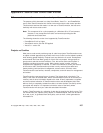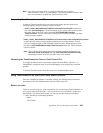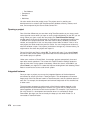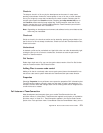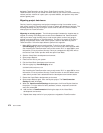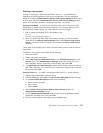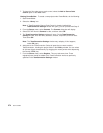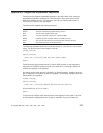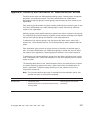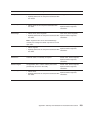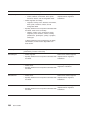
Appendix H. Supported expandable keywords
TeamConnection supports expandable keywords in text files. When a file containing
expandable keywords is extracted from TeamConnection, the current value of each
keyword is added to the file. This information can help you identify what version of
source code is used for your deliverables.
TeamConnection supports the following keywords.
Keyword Description
$ChkD; The time and date stamp applied during check in.
$FN; The file name complete with its path.
$KW; The start of keyword expansion. It expands to @(#).
$EKW; Keyword expansion is ended until the next $KW; keyword.
$Own; The user ID of the owner of the component that manages the part.
$Ver; The version of the part in TeamConnection.
The following examples show lines of code that change in a text file as a user extracts
a part. The text file used in this example is filex.hdr.
#ifndef_filex_hdr_
#define_filex_hdr_
static char _filex_hdr[]="$KW; $FN; $Ver; $ChkD; $EKW;";
#endif
TeamConnection ignores keywords until it finds a $KW; keyword. It then expands all
keywords until a $EKW; keyword is found. If the semicolon (;) following a keyword is
omitted, the keyword is not expanded.
No change occurs when the part is checked in to TeamConnection. However, when the
part is extracted, the keyword variables are updated. The following example shows how
the keywords are expanded.
#ifndef_filex_hdr_
#define_filex_hdr_
static char _filex_hdr[]="$KW=@(#) $FN=bin/filex.hdr; $Ver=1:1;
$ChkD=1998/03/20 18:13:19; $EKW;";
#endif
In the previous example, each keyword and its value appears in the output. The value
of the keyword is replaced each time the part is extracted. If you do not want the
© Copyright IBM Corp. 1992, 1995, 1996, 1997, 1998 275



